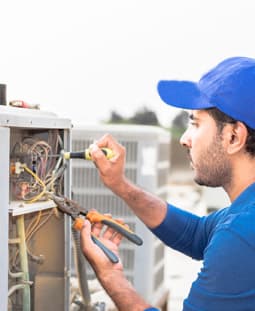Since climate change is ongoing to reshape our environment, its impact is being experienced across various industries, such as heat, ventilation, and air conditioning, commonly known as HVAC. Rising temperatures and shifting weather conditions are driving both companies to reevaluate their HVAC units. Today, it's vitally important than before to comprehend the way these systems work and how they can be improved for enhanced efficiency and convenience in an evolving climate.
This article we will explore the complex relationship between climate change and heating and cooling technology. From the latest innovations in energy-efficient systems to the necessity of maintaining indoor air quality, we will cover essential information that readers can use to enhance their heating experience. Whether you are looking to lower your energy bills, improve your home’s coziness, or adapt to changing climate, this resource will provide valuable insights into making smart decisions about your HVAC system.
Understanding HVAC Technologies
HVAC stands for heating, ventilation, and air conditioning, which collectively represent the technology employed to provide indoor climate control. An HVAC unit is crucial in regulating the desired temperature and air quality within residential and commercial spaces. It functions by employing various components such as furnaces, cooling systems, heat exchangers, and ventilation fans to regulate the environment. By comprehending the primary functions of each part, property owners can better understand how these mechanisms work together to create a pleasant living or working environment.
The heating aspect of HVAC units typically depends on heaters or heat exchangers to supply warmth during colder months. Furnaces burn fuel or use electricity to produce heat, whereas heat pumps relocate heat from outside air or the earth into the structure. On the flip side, air conditioning units serve to chill indoor spaces during warmer seasons. These units operate by extracting heat from the indoor air and releasing it outside, often utilizing a refrigerant to facilitate the heat exchange process. A well-functioning HVAC system ensures that the home stays comfortable during the year.
Ventilation is another crucial component of HVAC systems. It plays a vital role in ensuring indoor air quality by introducing fresh outdoor air and expelling stale indoor air. Proper ventilation can help reduce indoor pollutants, allergens, and humidity levels, contributing to a healthier environment for people. Many current HVAC systems incorporate advanced filtration and humidity control features, also enhancing overall air quality and comfort. By grasping these mechanisms, users can make knowledgeable decisions about their maintenance and upgrades, particularly in the context of shifting climate conditions.
HVAC Servicing and Efficiency

Regular maintenance is essential for guaranteeing the functionality and durability of your heating and cooling system. Basic tasks such as replacing vent filters, cleaning ducts, and inspecting components can avoid minor issues from growing into costly repairs. A properly serviced system not only operates more efficiently but also uses less energy, which results to lower utility bills. Planning seasonal tune-ups can assist spot potential issues ahead of time and keep your system functioning at optimal performance.
Furthermore, understanding the unique needs of your heating and cooling system can improve its effectiveness. Diverse units may require distinct maintenance routines depending on their type, vintage, and application. Monitoring an eye on the thermostat settings is also important; adjusting it wisely can reduce strain on your system. By being proactive and mindful of these factors, homeowners can significantly prolong the lifespan of their HVAC systems while enjoying a comfortable indoor environment.
Utilizing advanced technologies for monitoring and controlling your heating and cooling can lead to improved efficiency. Modern HVAC systems equipped with intelligent thermostats allow users to observe energy usage trends, adjust temperatures via apps, and receive alerts on maintenance needs. By leveraging cutting-edge solutions, homeowners can optimize their systems, making sure that they not only meet their heating and cooling needs but also contribute to comprehensive energy conservation and financial savings.
Advancements in HVAC Systems
The HVAC industry is experiencing remarkable advancements driven by the need for energy efficiency and sustainability. One of the most groundbreaking advancements is the integration of intelligent systems into HVAC units. Smart thermostats and sensors allow property owners to monitor and control their heating and cooling systems remotely, optimizing energy consumption and reducing costs. These gadgets learn user preferences and can adjust settings automatically based on environmental changes, enhancing comfort while minimizing energy waste.
Another major development is the development of variable refrigerant flow systems. These systems are designed to provide precise temperature control and are more efficient than traditional HVAC units. By using cutting-edge technology to adapt the refrigerant flow based on the heating and cooling demands of different spaces, these units enhance energy savings and improve indoor comfort. They are particularly beneficial in commercial settings where diverse temperature zones are often found.
Additionally, the emergence of environmentally friendly HVAC options, such as geothermal systems and solar-powered systems, marks a noteworthy trend in the industry. Geothermal technologies harness the stable temperature of the earth to provide heating and cooling, significantly reducing utility expenses and environmental impact. Check This Out -powered HVAC systems utilize solar energy to operate, making them an appealing option for eco-conscious consumers. These innovations not only support energy efficiency but also help mitigate the negative impacts of climate change, paving the way for a greener future in HVAC solutions.
